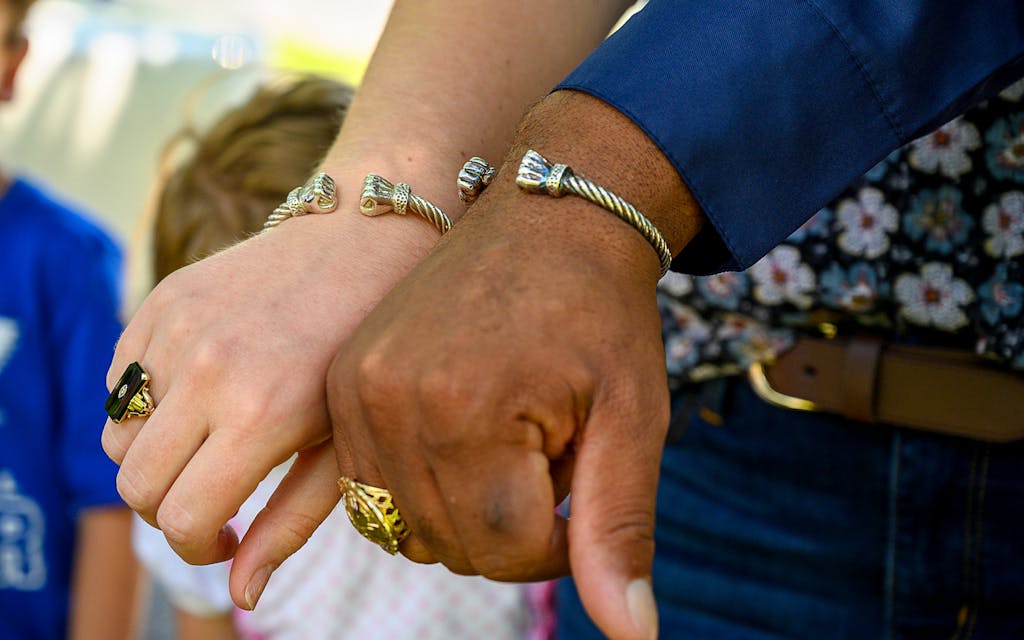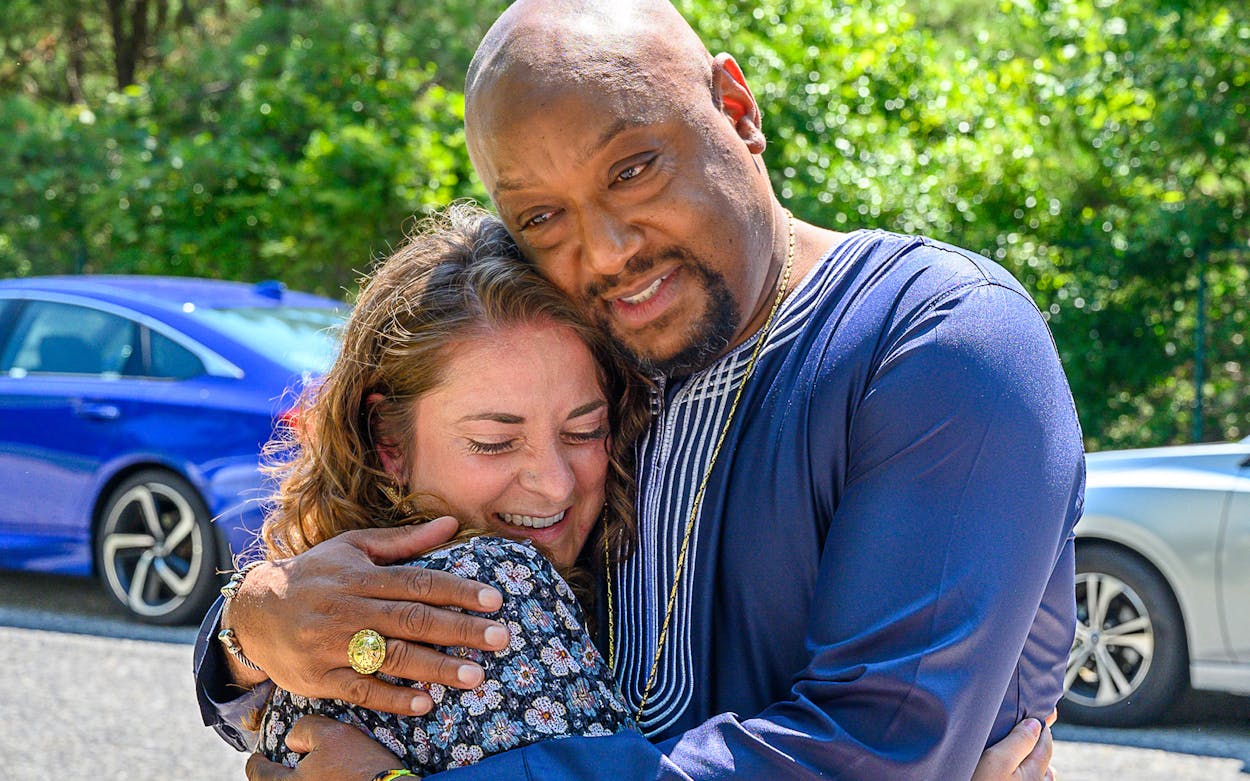Last winter, Heather Schaefer was browsing Facebook when a post caught her eye. “Please pray for my husband that God sends a type B+ living kidney donor to him,” it read. Written by Toshira “Chula” Maldonado-McIntosh, of Mays Landing, New Jersey, the plea appeared on a Christian page that both women followed. Maldonado-McIntosh went on to explain that her husband, Roy, had been battling severe renal failure for most of his life. A bout with COVID worsened his condition, and his relatives weren’t eligible to donate. Chula posted her request a few days before Christmas. “We believe in God for a miracle,” she wrote.
More than 1,600 miles away, at her home in Harker Heights, outside Killeen, Schaefer saw the message and felt a calling. Six months later, she was in a hospital gown, undergoing surgery at Fort Worth’s Medical City Transplant Institute. The transplant team airlifted Schaefer’s kidney to a Virtua hospital in Camden, New Jersey, where it was transferred to McIntosh. Texas Monthly caught up with Schaefer a year after she saw the post to learn what it takes to give a kidney to a stranger.
Texas Monthly: Was donating a kidney on your radar before this happened?
Heather Schaefer: It was not at all. I knew that kidney donation was a thing. But it kind of landed in my lap.
TM: How quickly did you realize, “Okay, this is something I want to do?”
Schaefer: As soon as I read her post, I knew I wanted to do it. I knew it depended on a lot of different factors, but I said, if this is possible and if I would be a good match, I would love to do it. I knew right then and there that I was going to do whatever it took to help him.
TM: Did you have any concerns like, “What happens if my husband needs a kidney at some point and I don’t have an extra one?”
Schaefer: I would like to say that I thought of those things, but I didn’t. To be honest, I guess I went into it with a lot of faith, just trusting that if this was something I was supposed to do, that it was meant to happen. But my other family members brought up things like that. My husband did say, like, “What if I need a kidney?” And my answer for that was, first of all, I don’t even know if I would be a perfect match for my husband or my kids. And so I may not have ever been able to give him a kidney. If for some reason anything comes up where we need a kidney, I just pray that there would be someone out there that would be willing to donate one.
TM: What was the process like?
Schaefer: It was about a six-month process. I started with blood tests, then physical examinations, and then more thorough tests—an MRI, a chest X-ray for blood clots, things like that. I also had to have a psychological test done to make sure I was mentally and emotionally ready.
TM: Was that part of the process a hassle? Was it exciting? I’d love to learn your emotional experience of the process.
Schaefer: I was excited about the end result. It was a little scary as well, just because there was so many little pieces that had to fall into place for the donation to actually happen. We didn’t tell Roy for a while, so I was just kind of doing all these tests and just hoping and praying it would happen. We didn’t want to get his hopes up until it was for sure.
TM: What’s your relationship with Roy and Chula like now?
Schaefer: We are family for sure. I call him my kidney brother. I’ve actually only met them in person once, but it was amazing. They have the most beautiful souls. They are so kind and so welcoming, and we all went out to dinner together. It was very, very nice. I’m so thankful to be a part of their life.
TM: When you do something that saves a person’s life, how do you get past their gratitude in order to have an equal relationship?
Schaefer: They did keep trying to give me gifts, and they’re not supposed to—it’s illegal to exchange human organs for anything. But I know why they want to give gifts—they keep saying that they feel like they owe me something. And I’ve had many conversations with them [to explain that] they don’t owe me anything. I am thankful just to see how healthy he is and to hopefully see the ripple effect that this story has for other people.
TM: How was the recovery process?
Schaefer: It was about a monthlong recovery. They said it would be about two to four weeks, so after two weeks, I went back to work and that was very challenging. I didn’t feel properly back to myself for a month. But I was looked after by family, and my mom was looking after my kids. So I was very well taken care of.
TM: Has the way your family feels about this changed over time?
Schaefer: It’s definitely changed. The first time I told my husband that I wanted to donate a kidney, he was not terribly excited about it. But then he came around and was very proud of me. It was similar with most of my family—the first time I told my parents, they were they were very polite about it, but I could tell they were nervous: “Are you sure you want to do this?” I started documenting the journey on YouTube, and I think that helped a lot, because once I shared with friends and family what I was actually doing, what it took, that it wasn’t just me on a whim deciding to do this, they all definitely came around.

TM: Talking with you, I’m like, “I’ve got two kidneys. I could do this.” Does that come up when you talk with other people about this?
Schaefer: Yes, absolutely. The process is very simple. It’s been made very simple by the National Kidney Registry, which has a way for people to get live kidney donors faster than by having to wait on a deceased kidney donation list. Basically, you can just go in and say, “Okay, I want to donate,” and they’ll test and match you with someone. My dream is that sharing my story gets more people to see if they can donate. There are a lot of people out there waiting.
TM: What have you learned from all this?
Schaefer: There was a point in the process when we had already scheduled the surgery, and my transplant coordinator told me that there was a very slight chance that they wouldn’t be able to put the kidney in his body, and they didn’t tell Roy this. And so I went into this knowing that there was a backup kidney recipient, just in case Roy couldn’t accept my kidney. So I knew there were two people waiting on a kidney and only one of them could have it. That was a very challenging feeling to have. It took a lot of faith and trusting that God knew what he was doing, and that there was a reason that I was connected with this couple across the country. But I knew that even if for some reason it didn’t work out for Roy, it was going to go to someone else who needed it. I remember that piece of the process as terrifying, and there was nothing I could do about it.
TM: Was the other potential recipient in the hospital at that time?
Schaefer: I think so. They had to be at that same hospital where the kidney was, just kind of waiting to see if they could get that kidney or not. I don’t know who that person was. But it’s pretty crazy what they went through as well.
TM: Are there other ways that this experience has changed you?
Schaefer: I’m definitely more aware of my health. I need to take care of myself and exercise and take care of my body, which I’ve always done, but I’m just a little more aware of that and a little more careful. It grew my faith a lot—that’s been a wonderful outcome of all this.
This interview has been edited for length and clarity.
- More About:
- Health
- Best Thing in Texas
- Killeen








